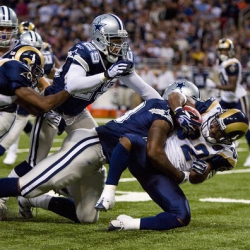With the National Football League regular season kicking off its first full schedule on Sunday, the American Gaming Association has chosen to remind Americans how much will be wagered on football this year. The AGA estimates that $90 billion is going to be wagered on NFL and NCAA football in the 2016 season.
Most of that $90 billion is going to be wagered illegally, which is why the AGA is talking about the issue. The AGA believes $88 billion is going to be wagered illegally through online sportsbooks or local bookmakers (“bookies”). That represents over 98% of all football wagers this season.
$2 Billion in Legal Sports Bets
Meanwhile, about $2 billion is going to be bet legally. Nevada is the only state with full, unfettered sports betting, so most of the wagers are going to be placed through Las Vegas sportsbooks. The rest are going to be wagered on sports lotteries in Delaware, Montana, and Oregon. In 46 U.S. states, sports bets are illegal in any form.
The American Gaming Association cites previous gambling studies to support its figures. Back in February 2016, about $4 billion was wagered on the Super Bowl. About $130 million of that was wagered through Las Vegas sportsbook operations.
AGA to Lobby US Congress
The AGA’s figures were part of a statement that it would begin to lobby the United States Congress soon to repeal the PASPA law and enact regulations of a legal sports betting industry. The Professional and Amateur Sports Protection Act or “PASPA” was passed in 1992 and serves as the federal government’s law on sports gambling. At the time, the four major American sports leagues lobbied to have a 50-state ban. Nevada and the other states fought to have a carve-out for their sports betting, so their legal games were grandfathered in to the law.
America’s Betting Landscape
The AGA believes the times have changed, though. Three of the four commissioners of those leagues (NBA, MLB, NHL) have signaled that they want legal sports betting, or at least that they’re willing to listen to solutions. Even more, the American people’s attitudes towards gambling have changed since 1992.
Tribal casinos are found in most states, while vendors for state lotteries are found in most convenience stores. Online gambling and mobile betting on smartphones have placed wagering squarely in the lives of everyday Americans. A ban on sports betting hardly seems to matter.
Geoff Freeman on Sports Gambling
Geoff Freeman, President of the AGA, said as much in his statement on the decision to lobby Congress. Freeman said, “The American appetite for sports betting has never been greater. Unfortunately, a failing federal ban drives this national pastime into the illegal market and threatens the integrity of the games we love. As law enforcement’s deep concern with the thriving illegal gambling market demonstrates, it is time to address this problem and bring sports betting out of the shadows.”
Geoff Freeman and the AGA argue that the 46-state ban on gambling has failed spectacularly. The attempt to prohibit sports betting has not ended the practice, but only driven it underground, where it makes bookies, offshore operators, and perhaps even organized crime families rich. In that environment, problem gamblers have no protection and no encouragement to break free of the pattern.
How Regulated Sportsbooks Are Better
In a regulated environment, legal sportsbooks would be required to include several tools to help problem gamblers. A self-exclusion list is common these days, in which gamblers who decide they cannot control their urges can exclude themselves from gambling for 6 months, 1 year, 5 years, or a lifetime. Such players do have quieter moments when their adrenaline is not flowing, when they realize the destructive nature of their out-of-control gaming. Such a list helps control those urges.
Modern websites have loss limits and bet controls, so a player cannot deposit more than a certain amount in a week, or their ability to gamble stops when they lose a certain amount. The bettor can pre-set these controls, because the gaming begins. Such sites are also required to post hotline numbers and other contact information for groups that counsel problem gamblers.
Regulated sports betting would be licensed and taxed. Not only would a sportsbook be motivated to stay within the law by the fear of losing the license, but they would be taxed, so the state treasuries could draw revenues. In some states, gambling is used to fund public education or scholarships.
Why Repealing the PASPA Will Be Difficult
Passing gambling laws is fraught with peril. So many interests get involved, including the brick-and-mortar gaming interests, religious groups, concerned parents groups, and social activists. One might think land-based casino operators would want sports betting, but they often do not want the competition expanded gambling might bring.
Also, it is hard to figure out where politicians stand on gambling. Votes on gaming laws are considered “votes of conscience” in the U.S. Congress. That means the party whips do not threaten and cajole members quite so much, so the strict party votes you see on other issues might not happen. Each senator and representative has to stand before his or her voters and defend their vote on such a moral issue.
Thus, the American Gaming Association likely is prepared to have their $90 billion figures ignored. In many way, Geoff Freeman and gaming advocates go through this ritual every year, where they tout the huge NFL betting figures. They hope that America has changed enough, and some members of Congress choose not to ignore the facts and figures this time around.

